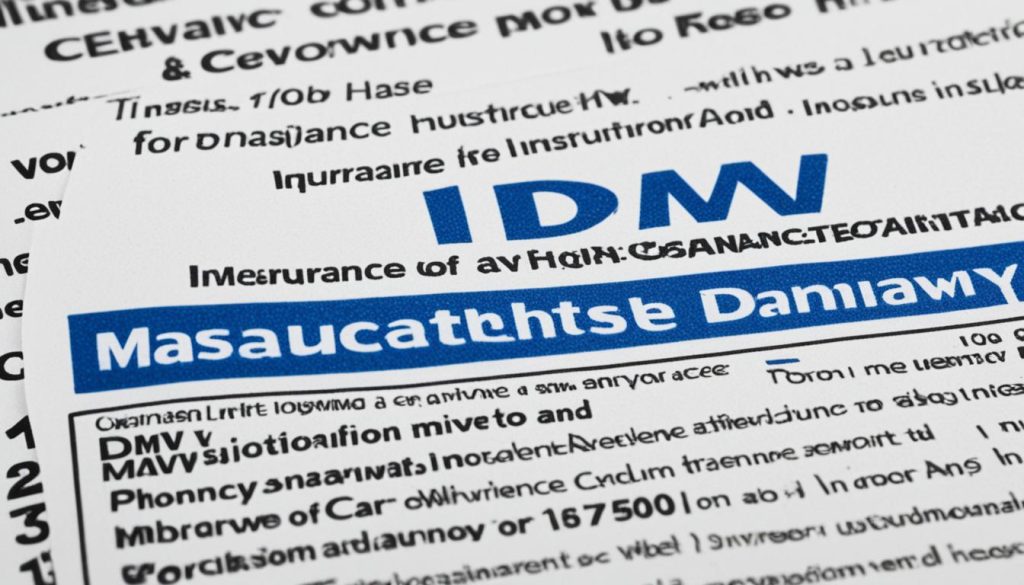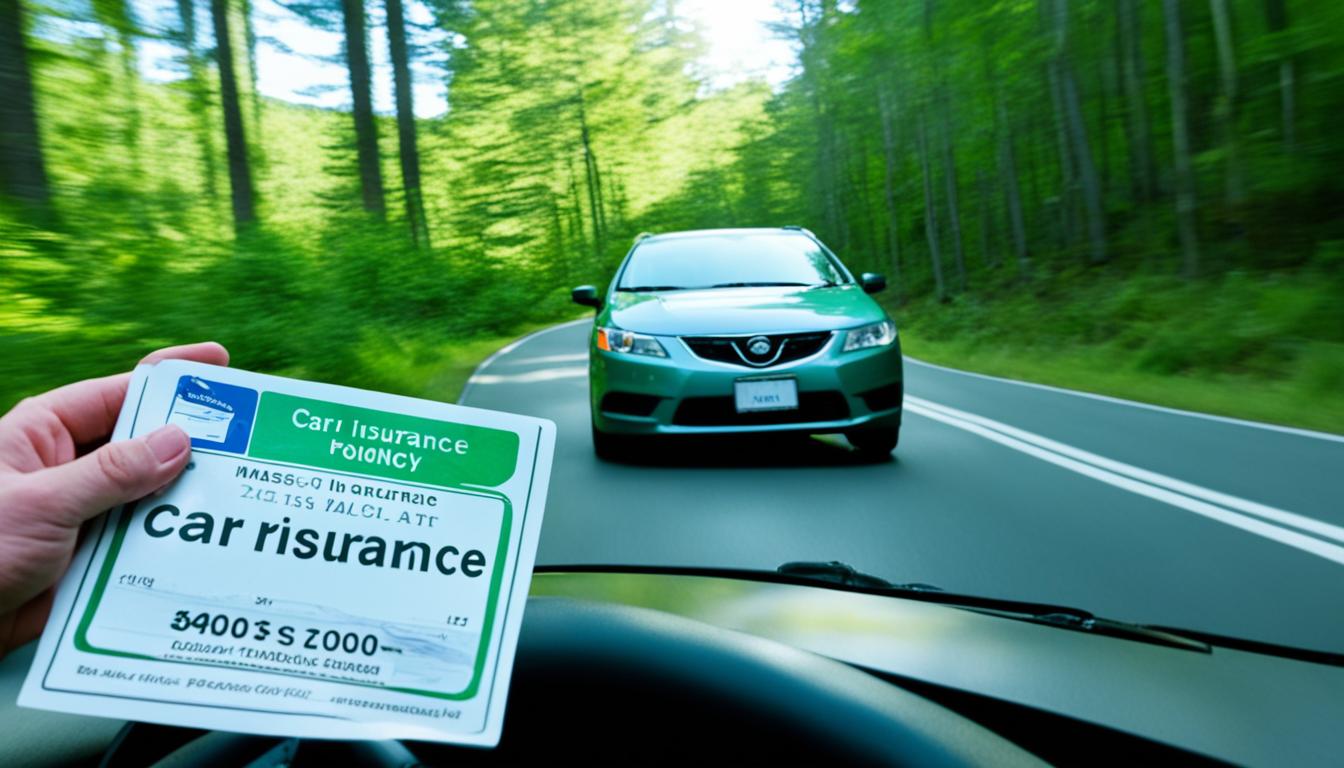When moving to a new state, it often makes sense for drivers to switch their car insurance. Insurance agents are typically licensed in one state, and different states have different insurance laws and requirements. If you’re planning to relocate to Massachusetts and want to change your car insurance, there are a few steps you need to follow.
Start by calling your current insurance agent to see if they offer coverage in Massachusetts. Check with the Massachusetts Department of Motor Vehicles to find out the registration and insurance requirements. Consider shopping around for quotes from different insurance companies to get the best rates. Finally, once you’ve chosen a new insurance company, you’ll need to buy a new policy, register your vehicle, obtain a new driver’s license, and then cancel your old policy. Following these steps will help you streamline the process of changing car insurance in Massachusetts.
Key Takeaways:
- When moving to a new state, it’s important to change your car insurance to comply with local laws and regulations.
- Contact your current insurance company to see if they offer coverage in Massachusetts.
- Check the requirements of the Massachusetts Department of Motor Vehicles for registration and insurance.
- Shop around for quotes from different insurance companies to get the best rates.
- Once you’ve chosen a new insurance company, buy a new policy, register your vehicle, obtain a new driver’s license, and then cancel your old policy.
Call Your Current Insurance Company
The first step in changing car insurance in Massachusetts is to call your current insurance company. Find out if they offer coverage in Massachusetts and if they can transfer your policy. They can also provide information about any changes in coverage costs associated with the relocation. If your current insurance company does not provide coverage in Massachusetts, they can refer you to an agent or company that does.
Call Your Current Insurance Company
The first step in changing car insurance in Massachusetts is to call your current insurance company. Contact them to find out if they offer coverage in Massachusetts and if they can transfer your policy. They will have the knowledge and expertise to guide you through the process of switching insurance providers. They can also provide valuable information about any changes in coverage costs associated with the relocation.
If your current insurance company does not provide coverage in Massachusetts, don’t worry. They can refer you to an agent or company that does. This referral can help simplify the process of finding a new insurance provider that meets your needs and preferences.
Remember, the goal is to ensure that you have the right coverage when moving states, and your current insurance agent is an excellent resource to help you navigate this transition.
Moving to a new state can be overwhelming, but with the guidance of your current insurance agent, you can smoothly transition your car insurance to meet the requirements of Massachusetts. By taking the time to call and discuss your situation, you can make an informed decision based on your unique circumstances.
Check with the Massachusetts Department of Motor Vehicles
After contacting your insurance company, it is essential to check with the Massachusetts Department of Motor Vehicles (DMV) to understand the registration and auto insurance requirements in the state. By visiting the DMV’s website, you can access specific information about the process. This includes the necessary documents, forms, and fees for registering your vehicle and obtaining auto insurance.
During the transition period, which is usually up to 90 days, it is crucial to comply with the DMV’s requirements for driver’s license, registration, and auto insurance. Failure to do so can result in fines for non-compliance.
When checking the Massachusetts DMV’s guidelines, be sure to familiarize yourself with the state’s minimum auto insurance requirements. Different states have different coverage standards, so it is crucial to understand the specific requirements in Massachusetts. Additionally, if you are moving from a fault state to a no-fault state, there may be additional forms of coverage needed to meet the state’s regulations.

Note: Image above represents the Massachusetts Department of Motor Vehicles (DMV) logo.
Buy a New Insurance Policy
Once you have gathered all the necessary information, it’s time to purchase a new insurance policy. This step is crucial in the process of changing your car insurance in Massachusetts. To ensure you make an informed decision and get the best coverage at the most affordable price, follow these steps:
- Getting Quotes: Start by requesting quotes from at least three different insurance companies. This will give you a better understanding of the rates and coverage options available to you. By comparing quotes, you can identify the insurance company that offers the most competitive rates for your specific needs. Remember to provide accurate information about your driving history and vehicle details to get accurate quotes.
- Choosing an Insurance Company: After receiving quotes, evaluate each insurance company based on their reputation, customer reviews, and financial stability. Check if the company has a good track record of settling claims promptly and providing quality customer service. Consider factors beyond just the premium cost, such as the company’s financial strength and customer satisfaction ratings. This will help you make an informed decision.
- Coverage Options: Assess the coverage options offered by each insurance company. Determine whether they provide the type and amount of coverage you need to protect yourself and your vehicle adequately. Pay attention to details such as liability coverage, collision coverage, comprehensive coverage, and uninsured/underinsured motorist coverage. Tailor your selection to your specific requirements and preferences.
- Deductible: Consider the deductible amount offered by each insurance company. A deductible is the amount you agree to pay out of pocket before your insurance coverage kicks in. Opt for a deductible that aligns with your financial situation. Keep in mind that choosing a higher deductible can help lower your premium but may require you to pay more in the event of an accident.
- Premium Cost: While price shouldn’t be the only consideration, it is important to choose an insurance policy that fits within your budget. Compare the premium costs quoted by different insurance companies and select the one that offers the best value for your money. Be cautious of any significantly low rates, as they may be indicative of limited coverage or poor customer service.
Once you have evaluated multiple insurance companies and their policies based on these factors, you can confidently select the insurance policy that meets your needs. Contact the chosen insurance company directly to complete the required documentation and finalize your purchase. Make sure to confirm the start date of your new policy in writing, ensuring a seamless transition from your previous coverage to your new insurance policy.

Register Your Vehicle and Obtain a New Driver’s License
After securing your new insurance policy, it’s time to take care of the necessary paperwork. To register your vehicle and obtain a new driver’s license in Massachusetts, you’ll need to visit the Massachusetts Department of Motor Vehicles (DMV) with the required documents. These include:
- Your current driver’s license
- Vehicle title
- Proof of insurance
- Proof of residence
- Proof of identity
Make sure to have these documents in order before your DMV visit to avoid any delays or complications. Additionally, be prepared to pay a registration fee at the DMV.

Once you’re at the DMV, they will guide you through the process of registering your vehicle. They will issue you a new license plate for your vehicle, representing your official registration in Massachusetts. It’s important to note that you’ll need to send your old license plate to the DMV in your previous state as part of the registration process. Take advantage of this visit to also obtain your new driver’s license, cutting down on the number of trips you need to make.
Conclusion
Changing car insurance in Massachusetts may seem like a daunting process, but by following these steps, you can streamline the transition. Start by contacting your current insurance company to see if they offer coverage in Massachusetts. This allows you to explore the possibility of transferring your existing policy and avoid the hassle of switching providers.
Next, check the requirements of the Massachusetts Department of Motor Vehicles (DMV) for registration and insurance. Understanding the specific regulations and deadlines will ensure that you remain compliant and avoid any penalties. Additionally, obtaining quotes from multiple insurance companies will allow you to compare coverage options and choose the policy that meets your needs and budget.
Once you have selected a new insurance policy, the next step is to register your vehicle and obtain a new driver’s license. This involves visiting the Massachusetts DMV with the required documentation and paying the necessary fees. Completing these steps promptly will ensure that you are legally authorized to drive in Massachusetts.
Lastly, don’t forget to cancel your old insurance policy and update your address with your former insurance company. This will help avoid any confusion or future correspondence being sent to the wrong address. By following these steps, you can successfully change your car insurance in Massachusetts and enjoy the peace of mind that comes with being properly insured.




No comments! Be the first commenter?